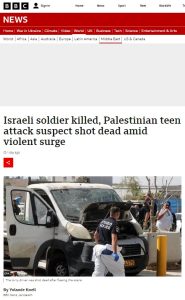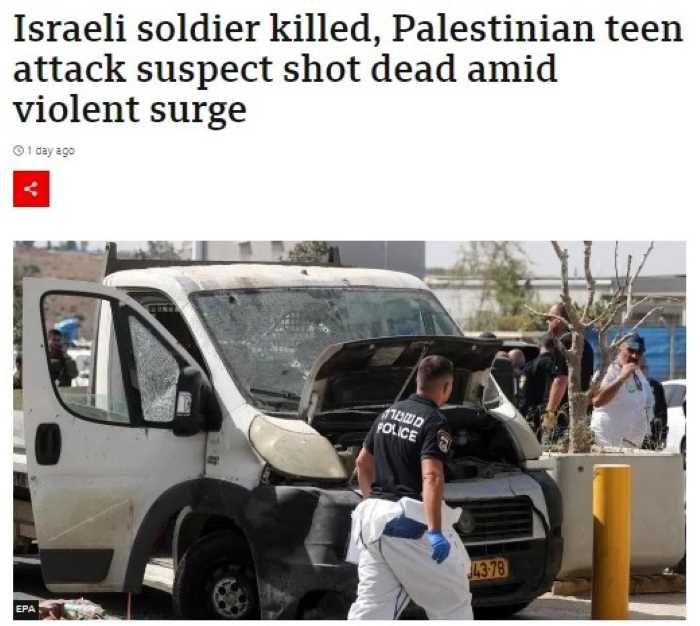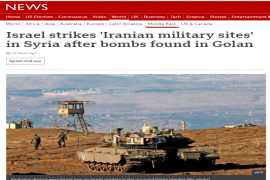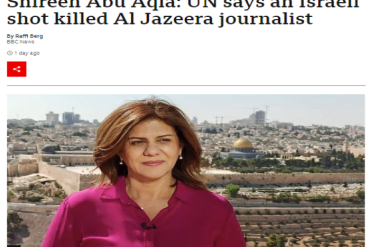Early on the evening of August 31st, a report by the BBC Jerusalem bureau’s Yolande Knell was published on the BBC News website’s ‘Middle East’ page under the cumbersome headline “Israeli soldier killed, Palestinian teen attack suspect shot dead amid violent surge”.
That report relates to several terror attacks, one of which had taken place earlier in the day and is described by Knell as follows: [emphasis added]
“An Israeli soldier has been killed and several other people wounded in a suspected lorry ramming attack by a Palestinian in the occupied West Bank. […]
According to an Israeli military official, the suspected ramming attack was carried out by a Palestinian man, who was 41 and had a permit to work in Israel. He was driving eastwards in a lorry towards the Maccabim crossing when he made a sudden U-turn.
He drove into a group of off-duty soldiers who were standing by the side of the road, dressed in uniform.
One soldier was killed. Three soldiers, two people in a passing car and a Palestinian worker were injured.
The driver of the lorry – which was not registered to him – then made off and was shot dead by Israeli security guards at another checkpoint some 6km (four miles) away. Pictures of the white pick-up truck show the windscreen riddled with bullet holes.
The checkpoint where the soldiers were allegedly targeted is on a busy main road which leads from central Israel, through the West Bank, to Jerusalem.”
Contrary to Knell’s claim that the attack took place “in the occupied West Bank”, it was carried out on Route 443, on the western side the Maccabim checkpoint. As reported by the Times of Israel:
“According to the Israel Defense Forces’ initial investigation, the Palestinian truck driver arrived at the Maccabim checkpoint from the Israeli side, made a U-turn without entering the West Bank, and ran over a number of off-duty soldiers who were walking on the side of the road.” [emphasis added]
Knell’s description of that attack as ‘suspected’ – twice – is all the more bizarre given that she herself states that the perpetrator “made a sudden U-turn” in order to attack his victims.
Knell’s report was not updated to include the name, age or additional personal details of the murdered soldier.
“The slain soldier was later named as Cpl. Maksym Molchanov, 20, who moved to Israel from Ukraine in 2017 through the Jewish Agency’s Naale Elite Academy, a program for Jewish teenagers to complete their high school education in Israel.
Molchanov was a “lone soldier,” which the military defines as troops whose parents do not live in Israel or who are not supported financially by their parents.
Last year, Molchanov donated bone marrow that saved the life of a 12-year-old boy.
He was posthumously promoted to the rank of sergeant.”
Neither are BBC audiences informed that the attacker – Daoud Abdel Razak Faiz, 41, from Deir Ammar near Ramallah – was claimed by Fatah.
Knell goes on to describe an earlier incident:
“Overnight, violence erupted in Nablus, in the northern West Bank, as Israeli soldiers attempted to secure a route for Jewish visitors to a sensitive holy site known as Joseph’s Tomb.
The location, close to Balata Refugee Camp, has been a frequent flashpoint since Israel captured the West Bank from Jordan in the 1967 Middle East war.
Four soldiers were injured when an explosive device was detonated next to them, the Israeli military said. Video shared on social media showed a large plume of white smoke rising into the air after the blast.
Some 30 Palestinians in Nablus were also injured during confrontations with the Israeli army, according to local medics.”
Knell failed to inform readers that the IED attack was claimed by the Palestinian Islamic Jihad terror group. She made no effort to explain to BBC audiences that access to Joseph’s Tomb and additional religious sites located in areas under Palestinian Authority control is guaranteed under the terms of the Oslo Accords or that the site is what she terms “a frequent flashpoint” because Palestinians regularly engage in violence, in breach that part of the agreement between Israel and the PLO.
Knell continues with a description of the incident involving the “Palestinian teen attack suspect” in her report’s headline. Readers find an opaque reference to an “invisible line”, by which she of course means the 1949 Armistice line which was specifically defined as not being a border.
“On Wednesday evening, a teenager from occupied East Jerusalem was shot and killed by an off-duty Israeli policeman at a light railway station, not far from the Old City. The stop is on the invisible line that divides East and West Jerusalem.
Israeli witnesses said that the boy stabbed a man in the back with a kitchen knife and that other civilians tried to disarm him and scuffled with him. Israeli police say that he was then shot by an officer who was on board the train.
Some Palestinian reports have given a differing sequence of events.”
Knell does not provide any evidence of having confirmed those “Palestinian reports” for herself before promoting that messaging concerning the knife attack by a 14-year-old from Beit Hanina.
A fourth incident is described by Knell as follows:
“Earlier in the day, a Palestinian man had been shot and seriously wounded by Israeli troops after allegedly ramming them with his car and injuring one soldier, near the southern West Bank city of Hebron.”
The background to those four attacks – none of which is described by Knell as terrorism – is portrayed as follows:
“In the past year and a half, there has been a rise in Palestinian shooting and vehicle ramming attacks against Israeli civilians and soldiers. There have also been an increased number of Israeli military raids and mass arrests in the West Bank and an upturn in violence against Palestinians by extremist settlers.”
Knell fails to adequately clarify that the IDF’s counter-terrorism operations are the consequence of that rise in Palestinian terror attacks rather than something that “also” happens to take place. Readers then discover that the BBC’s portrayal of Palestinian casualties relies on information provided by the Palestinian Authority – which is of course dominated by the same Fatah faction that claimed the terrorist responsible for the attack on Route 443 – and that the BBC itself is not able to inform its audiences that the vast majority of those killed were linked to terrorist organisations and/or engaged in terrorism or violent rioting at the time.
“In 2023 so far, more than 180 Palestinians have been killed by Israeli fire in the West Bank and East Jerusalem, according to figures collated from PA sources. Israel says most of those killed were militants, but stone-throwing youths protesting against incursions and civilians not involved in any confrontations have also been killed.
Some 33 people – the vast majority of them civilians – have been killed in Palestinian attacks against Israelis during the same period.”
Knell’s portrayal of the number of Israelis killed in Palestinian attacks does not include the word terror and does not clarify that six of the civilians murdered were minors between the ages of six and seventeen.
Related Articles:
THE BBC’S NARRATIVE ON ‘EAST JERUSALEM’ OMITS RELEVANT CONTEXT
BBC NEWS GLOSSES OVER REPEATED PALESTINIAN VIOLENCE AT HOLY SITE
BBC NEWS AGAIN SIDESTEPS AN ISSUE THAT DOES NOT FIT THE NARRATIVE






so Knell, whoever she is, belongs to the Palestinian camp. Instead of
to criticise her it might have been wiser to just kick her under the bus.
I am fed up with people who love to spit on well faring countries such as Israel in the name of countries or would be countries with nightmare leaders such as Hamas, Jihad blabla and other nightmares.